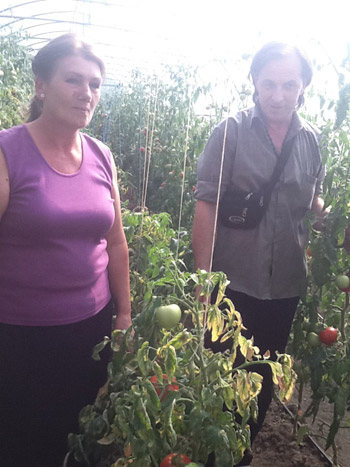By Sheri Rosenfeld, LICSW, LCSW-C
Day 6: Srebrenica
Of all the days in this journey, this 12-hour period of time on the last day was the most memorable, disturbing, life changing, and eye opening. Our day began with a 3-hour treacherous drive through the beautiful mountain sides of Bosnia. Our goal was to reach Srebrenica in order to pay homage and bear witness to one of the world’s greatest post World War II tragedies. Although many tragedies in Rwanda, South Sudan, the World Trade Center, Afghanistan are horrendous, I know of nothing in contemporary world culture as diabolical as the atrocity on July 11-13, 1995 in Srebrenica, a small village 10 kilometers from the Serbian border.

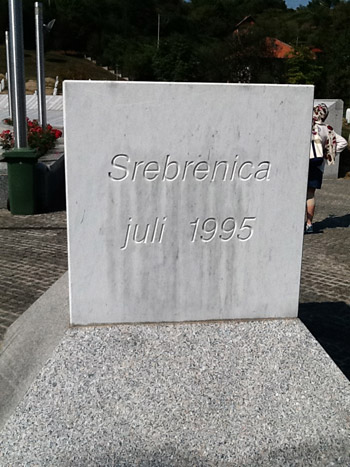
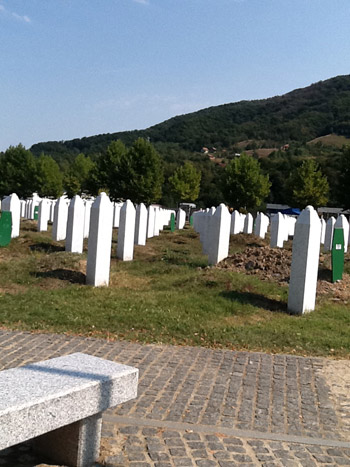
The background, brief story, is that the Serbian leader wanted to seek revenge on the Bosnian Muslim people for invasion by the Turks in the 1400s. But most, if not all, Bosnian Muslim people do not see identify themselves as Turks: They are Slavic people. Even though they may have ethnicity in common with the people of the Turkish Empire, many do not identify them, and have not been able to comprehend the logic of the revenge motive that led the Serbs to want to annihilate them. The Serbs surrounded the city of Sarajevo, by shutting off all access to food and water and electricity for 48 months. The war, however lasted 5 years in the villages, Mostar, Zenica, Serbenica. The great world powers did not come to their aid until the Dutch sent in a UN Security team, but only to keep peace, not to fight. The Dutch intervention proved to be the catalyst for the massacre of 8,000 men and boys and the desecration of the women by torture and rape since their orders were to protect without firing. That proved to be worthless.
On the command of the Serbian leader, a whole population of innocent people was exterminated in a matter of a few days, and the country was left traumatized and beaten. Twenty-five thousand people fled to a small village, Srebrenica, a protected UN Military safe zone, where they were supposed to be safe. What happened then was remarkable, horrific, and difficult to digest. One woman told a story of how her baby was crying in her arms because they hadn’t eaten for days as they walked to this village. A Serbian soldier told her that he knew how to quiet the child, and slashed his throat in the mother’s arms. Thousands of young boys 12 and up were separated from their mothers and collected with their fathers to be executed. The mothers and daughters were taken on a bus and transported to other buildings having no idea what would become of their sons and husbands. In that day, 8,000 men and boys were executed and buried in mass graves which were later moved so as not to be found. All the while, the people in Sarajevo could not help because they had no idea that this was happening. Much of the guilt, I am told, stems from the fact that they could not help their neighbors and fellow Bosnians.
After we visited the burial grounds (see below) and the museum and listened to a documentary about this ethnic cleansing, we visited a woman’s home. Jasenka, had a beautiful greenhouse, a wonderfully clean home, many pastries and Turkish coffee to share with us. She then told her story of how she was separated from her son and husband as she was fleeing to the old factory where everyone believed that the Dutch soldiers would protect them. 25,000 people came to that factory. Women and children were separated from their sons over 12 years of age and all the men. But her story, even though very sad, is also a story about hope and determination and pride. It’s also a story about the possibilities in life when you connect with others to gain strength.

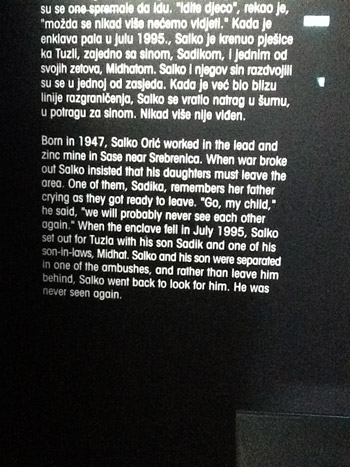
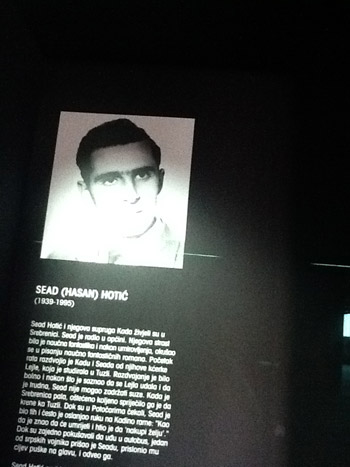
Jasenka lives alone now. But she has a daughter who witnessed the atrocities along with her on that day. Her daughter was determined to not let her life story or the loss of her family derail her. She went on to get her Masters degree and PhD and now lives in London with her husband and 2 children. Jasenka created a beautiful garden. She grows all the food she needs to survive and also has a cutting flower garden. She now has a small souvenir store that sells flowers across from the memorial park where her son and husband are buried. Not only is she doing well in business but she feels she is healing just by being near her family. She belongs to the association where the women support each other in their various businesses, all of them learning through Women for Women that they can use their talents in commerce.
What is most remarkable about these women is that they used to follow their husband’s lead. They had no idea of what their rights were or how to make an income, and they did not even believe they had a voice. Many of these women do not have an education past elementary school, cannot read or write. But through WFW they have an organization that believes in them and gives them a future.
Bosnia has very few opportunities and the world still seems to have forgotten that these people are hurting terribly. I was grateful to be a witness to their history, their struggle, and their resilience. I hold them in my mind and in my heart, and I hope to return one day and bring others with me.






